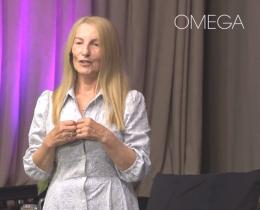Growing up and growing on is inevitable no matter how hard you try to stop the clock. And yet, in this image-oriented culture, it’s easy to be fooled into thinking that if you keep your youthful appearance, stay on the treadmill of meaningful work, and attempt to be current when in the presence of your grown children, then nothing much has really changed in your life. When truthfully, the way you were is not the way you are. It only takes a quick glance at the family photo album to confirm that reality.
You need to learn to accept change, revel in the new phase you find yourself in, and love the unknown. My attitude around all this was aided and abetted by two astute teachers, my 94 year-old mother and my mentor Joan Erikson, wife of psychotherapist Erik Erikson. Both were stunning examples of growing old gracefully—neither bothered to dye their hair or hide their wrinkles. In Joan and Erik Erikson’s life cycle theory, “the work you have to do in middle age is fight stagnation with generativity…to see the excitement in metamorphosis rather than attempt to hold on to what is impossible to keep—in other words to embrace change and find the strength in it.”
Acceptance means coming to terms with what you are given; to play with the hand you are dealt, to see the reality of the situation, and to evaluate your choices. Resignation, on the other hand, renders you powerless and is fraught with negativity—giving up and giving in, wishing for a different hand, clinging to illusion and therefore staying stymied and stuck.
I’m no different than anyone else when change is thrust upon me. Immediately anxious, I try to find my way around it instead of going through it. Yet, this past year has brought nothing but changes, all of which offered no exit. There was a knee operation, followed by a falling out with a business associate, and finally, the death of my mother. No way around any of it, yet in retrospect, the lessons and wisdom from these various crises offered possibilities like never before.
Training myself to go with the flow has worked wonders. It takes me back to a picnic on one of Cape Cod’s barrier beaches. Three couples piled into two Jeeps laden with food, small and large tables, a gas grill, a canvas windbreaker, plates, glasses, and plenty of wine. The vehicles skidded through mounds of sand and stopped at the top of the high-tide line. It was the perfect night—a roaring sea with 10-foot waves slapping on shore, gulls swirling overhead, and clouds behind us promising a colorful sunset. No sooner had everyone unpacked and settled in, Chardonnay in hand, when our host wondered if the tide was going in or out. We learned from a nearby fisherman that high tide would be in two hours, plenty of time to eat and run. But minutes later, we were smacked by three rollers, forcing us to move our gear toward the dunes two times during our adventure.
In situations like these as in life, it’s all part of the fun—what you must expect and accept when camping in the wild—even when the stakes are high and the changes that keep coming are more dire. No one can control the way life passes; you can only adapt. Whether it is moving to drier land or dealing with a serious situation like a tough diagnosis, a betrayal, loss of a job, change of home address, or a new family configuration, this journey is not just progressing through the world but moving through stages of ever-deepening understanding.
You are meant to become observers and participants of your growth, scholars of self and soul—truly embracing the unfinished parts of yourself and becoming someone you never intended to be.
A young reader of mine emailed recently. She had just moved to Los Angeles with her boyfriend and wanted everything about her future to be known “right NOW!” Every time she used the word “NOW” she capitalized it, as if her life could be preplanned, perfected, and styled somehow. Could I help her figure it out and give her a plan?
I answered, “Now is not the time to get answers…now is the time to stay with the transition…that uncomfortable place where you feel as though you are in limbo but through which you will grow the answers you are seeking about now. Being young and in limbo is right for you now. If you need to give yourself a time limit do so…like a year of listening to what your heart needs to say. You have 8,700 hours this year to move here and there…plenty of space to let your psyche develop truthful instincts and intuitions. You are meant to be for now and live into your next stage, which will only be obvious when you sense it. Nothing worthwhile can be forced or hurried. Be your change.”
Sometimes it helps to take yourself away from your daily life because you know you are changing, and need some time to think and feel your way into your transition. If you do this you may feel yourself moving through the portal to the other side, an unfinished woman ready to transcend herself again and again.
Joan Anderson is the author of 16 children’s books and five memoirs: A Year by the Sea, An Unfinished Marriage, A Walk on the Beach, A Weekend to Change Your Life, and The Second Journey. She has appeared on The Oprah Winfrey Show and is a frequent speaker at conferences throughout the country.



